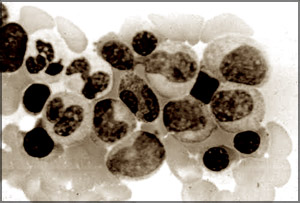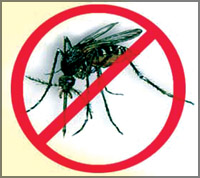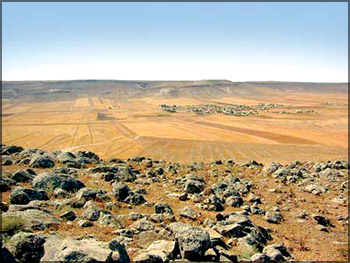
Tackling iron deficiency
In developing countries such as Sri Lanka, nutritional problems are
rather common. Although our country has fared relatively well compared
to our neighbours in the region, this doesnít mean we have nothing to
worry about.
|

Iron deficiency in the blood |
The nutrition of children has been a much discussed issue in the
island. There are many children who are suffering from various
nutritional deficiencies. Iron deficiency is said to be
rampant(flourishing) here with 20 per cent of the islandís children
suffering from it.
However, this problem is rife(common) not only among children, but
also among pregnant women; 30 per cent are said to suffer from iron
deficiency. These issues will be addressed through the National
Nutrition Month which came into effect from June 2. The theme of the
month is ĎLet us get together to promote national nutritioní.
Some of the programmes that will be a part of the activities are
awareness programmes about the effects of iron deficiency and what
people can do to avert diseases which may occur as a result.
The programmes to do with the special month will be carried out by
the Family Health Bureau, Health Education Bureau and Medical Research
Institute.
The assistance of NGOs and the private sector will also be extended
towards this programme.
Clean up your garden and prevent diseases
 Have you taken a good look at your garden lately? If you havenít done
so, it is time you did! Dengue, chikungunya and a host of other diseases
have raised their ugly heads once again. Keeping your surroundings clean
so that they donít become breeding grounds for all sorts of mosquitoes
is what you could do to control the situation. Have you taken a good look at your garden lately? If you havenít done
so, it is time you did! Dengue, chikungunya and a host of other diseases
have raised their ugly heads once again. Keeping your surroundings clean
so that they donít become breeding grounds for all sorts of mosquitoes
is what you could do to control the situation.
According to the Public Health Department of the Colombo Municipal
Council (CMC), there is a 95 per cent increase in the number of dengue
cases in the Colombo city with many patients aready been admitted to the
Colombo National Hospital.
The CMC is already carrying out awareness programmes to control
dengue and chikungunya; cleaning up gardens and potential mosquito
breeding grounds is part of this programme. Householders have been given
one weekís notice to take action to prevent mosquito breeding within
their premises; legal action will be taken against those who fail to
comply with the regulations.
Apart from Colombo, an outbreak of chikungunya and viral fever has
also been reported from the Ratnapura District too. The torrential rains
which resulted in flooding and the gem pits and swamps in the area have
also led to large-scale breeding of mosquitoes.
Show your father that you care
 Today is the third Sunday of June. Do you know what is special about
this day? It is Fatherís Day! It is on this day that fathers all over
the world are celebrated and honoured. There are many theories as to the
origin of this day. Today is the third Sunday of June. Do you know what is special about
this day? It is Fatherís Day! It is on this day that fathers all over
the world are celebrated and honoured. There are many theories as to the
origin of this day.
Some believe it started with a church service in Western Virginia,
USA in 1908 while others believe it started in Washington DC. However,
it is largely accepted that the day was mainly promoted by a Mrs. Bruce
John Dodd (Sonara Smart) of Spokane, Washington, who thought of the idea
while listening to a Motherís Day sermon in 1909.
Sonara wanted a special day to honour her father, William Smart, who
was a civil war veteran. Sonaraís mother had died at childbirth, and it
had been her father that had brought up his six children, making many
personal sacrifices along the way.
Some may think that concepts such as Fatherís Day are rather alien to
Sri Lanka and in a way it is true. We donít need a special day to love
and honour our fathers and mothers. They are always with us, showering
us with love and affection and guiding us in the correct path. We can
also show them the love and respect we have for them every day of the
year.
But, if you havenít been doing this, if you have been unkind and
uncaring where your father is concerned, today is certainly the day to
start making a difference. Show him you care, and gradually, you would
be able to make every day a Fatherís Day.
Combating desertification and drought
 By now, you may know that the world is undergoing a food crisis. One
reason for this is the declining availability of land for agriculture
purposes. Most of the land has been gobbled up by housing and industrial
needs while much of the remaining land has also turned infertile due to
extreme desertification and drought, turning them unsuitable for any
kind of cultivation. By now, you may know that the world is undergoing a food crisis. One
reason for this is the declining availability of land for agriculture
purposes. Most of the land has been gobbled up by housing and industrial
needs while much of the remaining land has also turned infertile due to
extreme desertification and drought, turning them unsuitable for any
kind of cultivation.
This issue will be highlighted on the World Day to Combat
Desertification and Drought, on June 17. The UN Convention to Combat
Desertification (UNCCD) has decided on the theme for this year as
ĎCombating Land Degradation for Sustainable Agricultureí.
The special day has gained added significance all over the world as
there is an urgent need to control the process of desertification and to
strengthen the visibility of this issue on the international
environmental agenda.
The UNCCD is the only internationally recognised, legally binding
instrument that addresses the problem of land degradation (worsening) in
the drylands and which enjoys a universal membership of 191 country
parties.
It plays a key role in global efforts to eradicate (wipe out)
poverty, achieve sustainable development and reach the Millennium
Development Goals, in particular with regard to the eradication of
extreme poverty.
The World Day to Combat Desertification and Drought was declared by
the UN General Assembly in 1994 to mark the anniversary of the UNCCD,
which plays a key role in the fight against deserts and desertification.
The main objectives are to remind everyone that desertification can
be tackled, that solutions are possible and that the key tools to solve
it lie in strengthened community participation and co-operation. |
